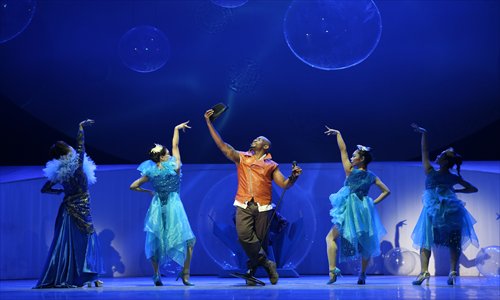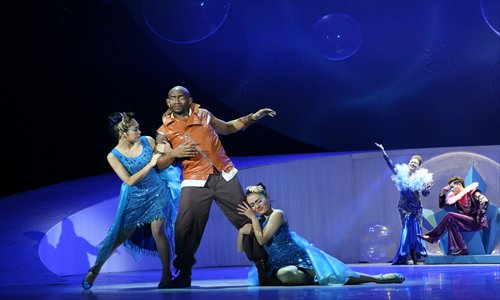

A tug of war takes place between the Monkey King, played by Apollo Levine, and two Chinese actresses in a new musical adaptation of Monkey King. Photos: Courtesy of Beijing Genhua International Culture and Media
One of the four great classics of China, Journey to the West is still not widely known outside of Asia. But with a new musical adaptation, the story may gain traction with a wider global audience while also offering a new take on the beloved legend.
Broadway actor Apollo Levine as the Monkey King, together with an international cast from China and South Korea, bring to life Monkey King, a new musical that blends East and West. The story is Chinese and contains Eastern philosophy, but the dances and songs are done in a Broadway style. The lines are sung in a mixture of Chinese, English and Korean.
Monkey King premiered in Beijing on November 18, co-produced by Beijing Performance & Arts Group and Beijing Genhua International Culture and Media. The show kicks off a world tour and an encore performance at Beijing's Tianqiao Theater in December.
Journey to Western audiences
Written by novelist Wu Cheng'en in the 16th century, Journey to the West is based on Tang Dynasty (618-907) Buddhist monk Xuanzang's pilgrimage to India. Xuanzang meets three disciples, the monkey, the pig and the sand demon, and the four manage to get to India and achieve enlightenment.
Based on the first seven chapters of the original's 108 chapters, the musical is written by US playwright James Racheff and composed by Louis St. Louis, who also penned songs for the iconic US musical Grease. Monkey King tells of the birth of the monkey (from a rock) and how he acquires the skills and cunning that later help him cause trouble in Heaven.
This production shows a more humanized Monkey King, "[who] wants adventure, wants to see the world, wants to go go go go go, and he keeps going," Tony Stimac, the US director of the musical, told the Global Times.
Like many outside China, Stimac had never heard of the Monkey King before receiving this assignment. But after watching the cartoon, reading the original story and viewing a few film adaptations, Stimac and his crew set out to try something entirely different.
Brave adaptations
Journey to the West in so ingrained in Chinese culture that nearly every art form has put out an adaptation of the legend, including Peking Opera, film, animation and TV dramas. The most popular version to date is the 1986 TV drama version, starring Liu Xiao Ling Tong as the Monkey King.
While many versions remain loyal to the original text, this musical challenges traditions by making the Monkey King an American who speaks in English and the Queen of Heaven a South Korean.
The fighting scenes, normally the most exciting parts, are eliminated, and instead dances are added in.
"We are not really trying to change what people think of the Monkey King. We are just trying to provide a modern view," Chinese director of the musical Hu Xiaoqing explained.
She said even for the older Chinese audiences this musical is a treat.
"I really don't think the older generation is as conservative or old fashioned as we think," Hu added.
There was a special performance held for senior citizens in Beijing last Wednesday night, and the occupancy rate reached nearly 90 percent. Few of the attendees left during the show, and many of them watched with their mouths wide open.
An audience member surnamed Fang, 62, told the Global Times after the performance that she attended out of curiosity. A fan of musical theater, she has seen many musicals like Cats and Mamma Mia, but found this work brought her the most delight.
"It's the same story, but it completely re-imagines the traditional appearance and behavior of the Monkey King," Fang said. "It is interesting to see a modern Monkey King from the Western viewpoint."
Fan Tao, a Chinese musical actor, wrote on his Sina Weibo that he felt "inspired" after watching Monkey King.
"It was very innovative both in the use of multimedia and staging. Though the level of Chinese of the foreign actors is a shortcoming, they wisely turned that into jokes," Fan wrote.
His one critique was that the plot development was "a little slow" for Chinese audiences already familiar with the story of Journey to the West.
Through the years, Chinese audiences have become more open to broader interpretations of the ancient saga.
Take, for example, when in 1994, Hong Kong director Jeffrey Lau directed the two A Chinese Odyssey films, which add romantic encounters to the Monkey King's story and make the monk a more chatty person. Many people railed against the deviations from the original text at the time, but the two later became classics.
When Stephen Chow's comic thriller Journey to the West: Conquering the Demons came out earlier this year, rewriting the background of the three disciples and putting Xuanzang into a romantic tragedy, the film brought in 1.2 billion yuan ($200 million) at the box office in Chinese mainland alone.
Role of a lifetime
In preparing for the role, Levine pondered his place in the Monkey King's legacy.
"[The Monkey King] has been around for such a long time and he has such a great impact on Chinese culture. You come from America and you don't want to offend anybody," Levine told the Global Times. "You just step back and say, 'Wow ... did they really pick the right person?' But he's a legendary character and you don't want to miss out on that."
Stimac points out that another version of Monkey King with a Chinese director recently showed in New York City at Lincoln Center.
"There were more articles written about that show than almost any other shows on Broadway," Stimac pointed out, adding that since this is a superhero story and "everybody in the West is crazy for superheroes, I think they would enjoy it."
As for the show's performance in China, Stimac said they are thinking about adding English subtitles to encourage expats to attend.
Chinese musical critic Wen Shuo said that traditional classics are well-suited to the international language of music.
"We cannot compete with Broadway using modern stories, but we have plenty of traditional legends to pull from," Wen told the Global Times.
He finds using an actor from the US to play the Monkey King an interesting choice since the role has long been played only by Chinese actors.
But, he concluded, "the Monkey King is a character who is wide open for interpretations."
We recommend:
